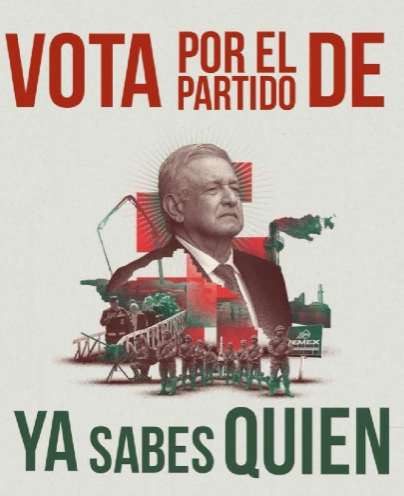by Mario Patrón
The self-proclaimed Fourth Transformation has, since its beginnings, employed a discursive strategy that presents its movement as the antithesis of the governments that preceded it. “We are not the same” is one of the phrases that has been used with great insistence in recent months, not only as a slogan in the context of the Fourth Government Report, but also as a response to various circumstances, especially in the course of morning press conferences.

With this phrase, the 4T has boasted of having put an end to serious human rights violations, repression, corruption, impunity, authoritarianism and neoliberalism, among other evils; however, the excessive reiteration of the statement only accentuates the contrast that prevails in the reality of those same issues — a little less than four years in office and in the midst of a dynamic of growing militarization, institutional and democratic weakening, and facing the continuation of serious structural problems that the country has been dragging along for decades.
One time opposing the misnamed war against drug trafficking and the subsequent Internal Security Law that was intended to be implemented towards the end of the previous six-year term, López Obrador proposed — during his campaign for the Presidency and ratified in his security agenda at the beginning of his term– the cessation of the military strategy and the promotion of a transitional justice and citizen security agenda. However, four years later, the military presence has been strengthened not only quantitatively, but also qualitatively, assuming more and more civilian tasks, contrary to the most elementary standards and guarantees for the maintenance and strengthening of a democratic regime.
The recent #SedenaLeaks have revealed data not only about the growing power of the armed forces and their participation in the civilian tasks that exceed their lawful duties, but also about the continuity of the modus operandi that the current government has identified as characteristics of previous regimes which it portrays to public opinion as its antagonists. The monitoring of candidates, organizations and human rights defenders; the prior knowledge of multiple operations of organized crime without preventive actions being carried out; the spying through the Pegasus software; and even the creation of an airline, or the implementation of a media strategy to increase the Army’s standing in society, are some of the findings revealed which stand out among the documents leaked by the Guacamaya collective. Findings that demonstrate the commitment to a militarization that violates the tasks constitutionally entrusted to it; in this way, the Internal Security Law promoted by Peña Nieto ended up being implemented under other codes.
Violence persists, albeit with a plateau that has halted the upward curve it had previously recorded, but it presents troubling figures. There is talk of more than 21,000 homicides up to September, and the most violent weekend so far this year was recorded with 286 intentional homicides between October 14 and 16. The same is true of violence against the press, with 36 journalists murdered during this six-year term, a figure not far from the 47 journalists murdered during the previous six-year term, according to Article 19. This is already the second most violent year for the press, with 11 journalists murdered in the first nine months of the year. It is equally serious that, in the first half of the current six-year term, it is estimated that at least 58 human rights defenders have been murdered.
On corruption and impunity, issues that were central to the 4T’s electoral campaign strategy, we also notice profound contrasts between its narrative and reality. Transparency International gives Mexico 31 points out of 100 in the population’s perception of corruption, which places it in 124th place out of 180 countries studied on a global scale. This position represents only two points of progress compared to 2017, when the country was rated with 29 points, while up to 2014 Mexico had scored 35 points.
Another recent measurement, the Index of Capacity to Combat Corruption, places Mexico in 12th position out of 15 Latin American countries, a decrease of 13 percent with respect to 2019. The dynamics of concentration of powers in the Executive, the attack on autonomous agencies and budget reductions to them are the main elements that have weakened in recent years the country’s institutional capacities to eradicate corruption. In terms of impunity, Mexico ranks 60th out of 69 countries evaluated by the Global Impunity Index, where it ranks as the 4th worst with respect to its justice system.
What the above data show is that, contrary to its discourse, in fact, the 4T does not prove to have carried out a serious commitment to fight corruption and impunity.
At a glance, the 4T looks more and more like a regime not of transformation, but of continuity with respect to the previous ones. It is not enough to repeat the refrain that “we are not the same” to hide a reality in which what stands out is a dynamic of militarization, concentration of power, attack on autonomous bodies, the press and rights defenders; the persistence of violence, the continuity of espionage and, as we have recently seen, the recurrence of practices of co-optation of the partisan opposition in the Congress. The scenario for 2024 looks to be extremely complex: a political regime that undermines the very foundations of its legitimacy, but that finds no contrast in an opposition lacking moral authority and political leadership.
Originally published October 20th, 2022. https://www.jornada.com.mx/2022/10/20/opinion/020a1pol English translation by Schools for Chiapas.
